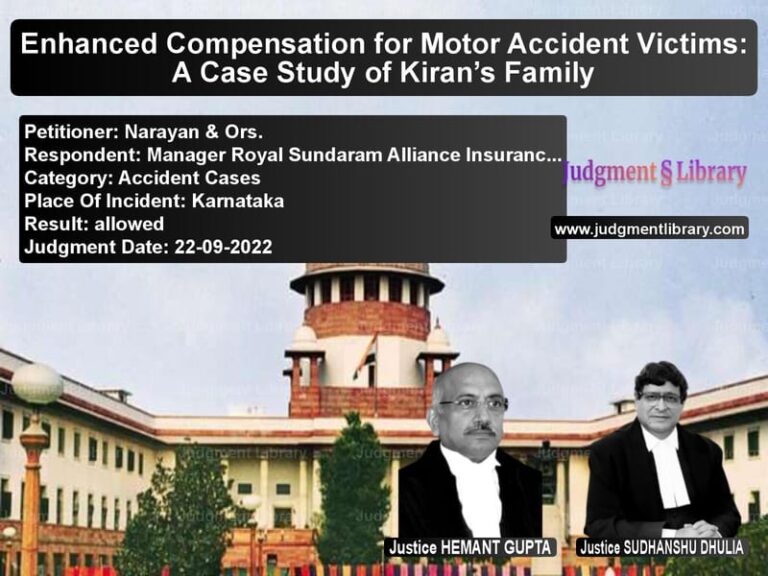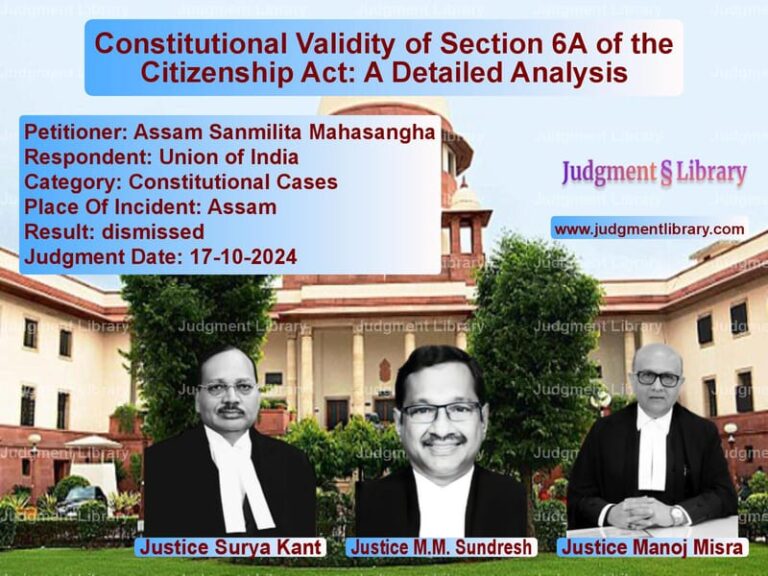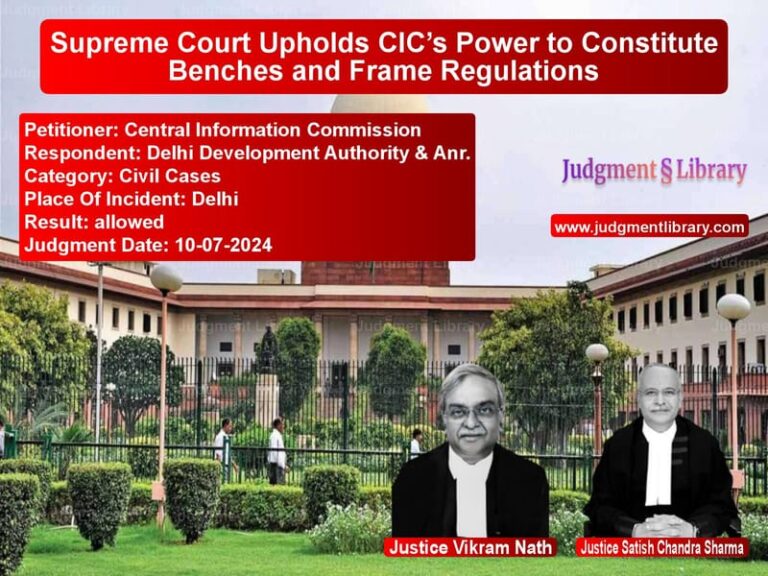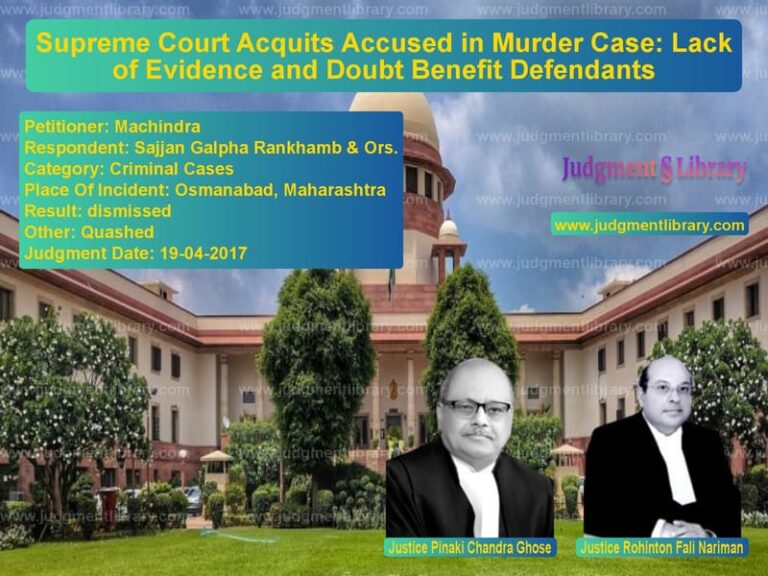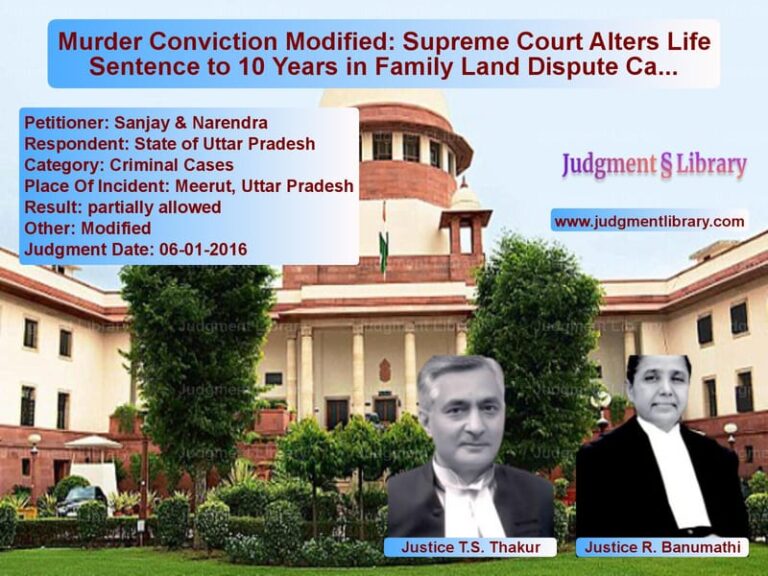Supreme Court Orders Retrial in Child Rape and Murder Case Due to Unfair Trial
The Supreme Court of India has set aside the conviction and death sentence of Naveen @ Ajay, accused of raping and murdering a 3-month-old girl, citing a rushed and unfair trial. The Court ordered a de novo trial, emphasizing the importance of a fair legal process and the accused’s right to defend himself adequately.
Background of the Case
The horrific case dates back to April 20, 2018, when a 3-month-old girl was found raped and murdered in Indore, Madhya Pradesh. The child’s parents, who were street vendors, had reported her missing early in the morning. Her lifeless body was later discovered, leading to the arrest of the appellant, Naveen @ Ajay. The prosecution charged him under multiple sections of the Indian Penal Code (IPC), including 363 (kidnapping), 366-A (procuration of a minor girl), 376(A) (rape causing death), 302 (murder), and 201 (destruction of evidence), along with provisions of the Protection of Children from Sexual Offences (POCSO) Act.
On May 12, 2018, the Sessions Court sentenced him to death. The High Court confirmed this decision, leading to an appeal before the Supreme Court.
Legal Challenges Raised
Arguments by the Appellant
- The trial was completed within just 15 days, from April 27 to May 12, 2018, denying the appellant a fair chance to present his defense.
- The legal aid lawyer appointed for the appellant was given no time to prepare an effective defense.
- The DNA report, a crucial piece of evidence, was not proven according to legal procedures, as forensic experts were not examined in court.
- The trial court forced the accused to produce his defense witness within a single day, which was unreasonable given that he was in judicial custody.
Arguments by the Respondent (State of Madhya Pradesh)
- The case involved overwhelming scientific evidence, including DNA reports and CCTV footage, proving the appellant’s guilt.
- The appellant did not object to the fast-tracked trial at the time, and his defense lawyer participated in the proceedings.
- The High Court confirmed the sentence based on strong forensic evidence.
Supreme Court’s Findings
Failure to Provide a Fair Trial
The Supreme Court found that the trial court conducted the proceedings in an “overhasty, stage-managed, tailored, and partisan” manner, violating the fundamental principles of a fair trial. It observed:
“The trial was conducted on a day-to-day basis, with all prosecution witnesses appearing without any summons. The accused’s legal aid counsel had no time to prepare an effective defense.”
Crucially, the Court highlighted that even the forensic evidence, including the DNA report, was not introduced properly, depriving the accused of a chance to challenge it.
Rushed Proceedings and Lack of Legal Representation
The Court examined the trial court’s records and noted that:
- The charge sheet was filed on April 27, 2018, and the court took cognizance on the same day.
- A legal aid lawyer was appointed immediately, but the court did not give him adequate time to prepare.
- Witnesses were examined without issuing summons, and no time was granted to cross-examine them adequately.
- The defense was denied an opportunity to summon expert witnesses, especially forensic specialists.
Referring to the case of Bashira v. State of U.P., the Court reiterated that a trial conducted in undue haste, without allowing the accused a meaningful defense, is unconstitutional.
Flawed DNA and Forensic Evidence
The Court also emphasized that the DNA report was improperly admitted, stating:
“Mere exhibiting a document does not prove its contents. Forensic experts were not examined, and the accused was never given an opportunity to question the report.”
The Court cited Rahul v. State of Delhi, which held that DNA reports must be properly introduced in court, and Manoj v. State of M.P., which stated that mishandled forensic evidence could not be relied upon.
Final Judgment
- The Supreme Court set aside the conviction and death sentence of the appellant.
- It ordered a fresh trial, ensuring that the accused receives proper legal assistance.
- The trial court was directed to provide an experienced defense lawyer through legal aid.
Conclusion
While the Supreme Court did not exonerate the appellant, it reinforced the principle that even in the most heinous crimes, the accused must receive a fair trial. The ruling underscores the importance of due process and the need to prevent judicial haste from undermining justice.
Petitioner Name: Naveen @ Ajay.Respondent Name: State of Madhya Pradesh.Judgment By: Justice B.R. Gavai, Justice Pamidighantam Sri Narasimha, Justice Prashant Kumar Mishra.Place Of Incident: Indore, Madhya Pradesh.Judgment Date: 19-10-2023.
Don’t miss out on the full details! Download the complete judgment in PDF format below and gain valuable insights instantly!
Download Judgment: naveen-@-ajay-vs-state-of-madhya-prad-supreme-court-of-india-judgment-dated-19-10-2023.pdf
Directly Download Judgment: Directly download this Judgment
See all petitions in Rape Cases
See all petitions in Murder Cases
See all petitions in Juvenile Justice
See all petitions in Legal Malpractice
See all petitions in Bail and Anticipatory Bail
See all petitions in Judgment by B R Gavai
See all petitions in Judgment by P.S. Narasimha
See all petitions in Judgment by Prashant Kumar Mishra
See all petitions in allowed
See all petitions in Remanded
See all petitions in supreme court of India judgments October 2023
See all petitions in 2023 judgments
See all posts in Criminal Cases Category
See all allowed petitions in Criminal Cases Category
See all Dismissed petitions in Criminal Cases Category
See all partially allowed petitions in Criminal Cases Category


